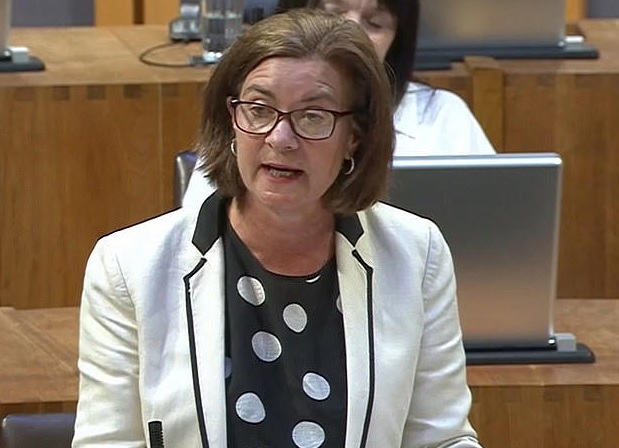News
A Pembrokeshire couple’s struggle with Lasting Power of Attorney application

IN LAWRENNY, Pembrokeshire a tale of love, resilience, and bureaucratic hurdles unfolded when Alan Woodhouse, 71, suffered a stroke earlier this year.
As his health began to decline, he found it increasingly challenging to manage his finances. To ease his burden, Alan and his devoted wife, Donna, 58, decided to apply for a lasting power of attorney (LPA), allowing Donna to take control of his financial affairs.
“I was more or less told that he wouldn’t be able to manage paying the bills,” said Donna, expressing her concern for her husband’s well-being.
An LPA is a legal arrangement that permits someone to act on your behalf if you can’t manage your finances or fear you won’t be able to do so in the future. The application must be approved by the Office of the Public Guardian (OPG), but time was of the essence for Donna and Alan.
With a sense of urgency, Donna filled out all the required forms from gov.uk and sent them off to the OPG in early April. However, the couple’s hopes were dashed two months later when they learned that their application had been rejected due to a minor issue with one of the dates beside Alan’s signature.
“There was a tiny line through the 0 in the date,” recounted Donna, visibly devastated by the rejection. “I thought it had all gone through. To my mind, it was silly.”
The rejection meant that Donna had to apply for another power of attorney, with the average registration process taking a staggering 20 weeks. The OPG offered a reduced fee of £41 if she resubmitted the application within three months, but the prolonged wait left Donna concerned that Alan’s health could worsen before the forms were approved.
Donna’s experience is not unique, as thousands of people across the UK face similar challenges with LPA applications. Financial and health LPAs have faced rejection at an alarming rate of 16.5% since 2018, according to data from the wealth manager Quilter.
In the past two financial years, the number of rejections has spiked, causing distress and uncertainty for many families. During the 2021-22 financial year, a staggering 31,254 LPAs were rejected, with the following year seeing only a slight dip to 29,124 rejections. These figures are significantly higher than in previous years, reflecting the growing concerns surrounding the LPA process.
Rosie Hooper from Quilter highlighted the difficulties applicants face, stating, “Navigating through the complexities of LPA applications can often feel like a difficult path.”
The primary reason for the high rejection rates lies in families’ lack of understanding of the legal requirements outlined in the Mental Health Capacity Act, according to Nicola Bushby from the law firm Boodle Hatfield. Many applicants inadvertently include instructions that violate the Act, leading to their forms being rejected.
Bushby emphasised the need for clearer guidance for families, suggesting that better alignment with the Mental Health Capacity Act could alleviate the issue. One common mistake involves the signing order, where improper sequencing invalidates the LPA.
Sarah Lockyer from the law firm Nockolds further highlighted potential pitfalls, noting that any mistakes on the form must be corrected in a specific manner, with initials from all involved parties to validate the changes. The use of Tipp-Ex is strictly prohibited, she warned.
In response to the rising concerns, the Ministry of Justice assured that plans to modernise and simplify the LPA process are underway, aiming for quicker and error-free applications, while strengthening fraud protection.
A Ministry of Justice spokesperson told The Pembrokeshire Herald: “If an application is started on our online LPA service, any issues will be highlighted so they can be rectified before the application is printed, signed and sent in to be registered.”
“Plans to modernise and simplify LPAs are going through Parliament — meaning the process will be quicker, with fewer errors and better protection from fraud.”
As families like Donna and Alan’s continue to navigate the intricate LPA landscape, it remains essential for individuals to seek expert advice and fully comprehend the intricacies of the process. With improvements on the horizon, hope shines through that the bureaucratic roadblocks will be cleared, allowing families to secure a lasting power of attorney with greater ease and confidence.
Adapted from an article originally appearing in The Times
News
Political leaders and unions react to Milford Haven school assault

First Minister, MP, MS and teaching unions call for safety and support for staff
POLITICAL leaders and teaching unions across Wales have spoken out following Thursday’s assault on a teacher at Milford Haven School, which led to a lockdown, a major police response and the arrest of a 15-year-old boy on suspicion of attempted murder.
The First Minister Eluned Morgan said she was “deeply concerned” by the incident and stressed that violence had no place in Welsh schools.

Her comments come just days after she visited the Milford Haven campus following the school being placed into special measures by Estyn, where she met leaders to discuss improvement plans and support arrangements.
She said her thoughts were with the injured teacher, their family and the wider school community, and praised the swift response of staff and emergency services.

Local MP Henry Tufnell, who represents Carmarthen West and South Pembrokeshire, described the incident as deeply upsetting for what he called a close-knit community.
He said he was thinking of the teacher and pupils affected and thanked Dyfed-Powys Police and ambulance crews for their professionalism.
Meanwhile Senedd Member Samuel Kurtz said: “Deeply concerning news across the water in Milford Haven.
“Sadly, violence in our schools is becoming all too common, and thanks must go to the emergency services for their timely response. Thoughts are with the injured teacher, their family and the wider school community.”
Leader of the Welsh Conservatives Andrew RT Davies said teachers must feel safe at work and called for continued support for school staff.
Teaching unions also responded.
NASUWT said teachers “deserve to feel safe in their workplace” and that any violence against staff must be taken seriously, while National Education Union said schools must remain safe spaces for both pupils and staff and urged continued focus on safeguarding and behaviour support.
All said support would be offered to the Milford Haven school community in the days ahead as police investigations continue.
Crime
Teacher discharged as police step back from Milford Haven school after assault

Teenager remains in custody as school closes and patrols increased to reassure community
POLICE have confirmed they are no longer stationed at Milford Haven School after a teacher was assaulted by a pupil on Thursday afternoon (Feb 5), as the injured member of staff has now been discharged from hospital.
In a joint statement issued by Dyfed-Powys Police, Pembrokeshire County Council and Hywel Dda University Health Board, Superintendent Chris Neve said swift action had been taken to protect pupils and staff.
He said: “Police are no longer in attendance at Milford Haven Comprehensive School, following a report of the assault of a teacher at approx. 3.20pm this afternoon.
“I would like to reassure parents, and the wider community, that swift action was taken to both safeguard pupils and teachers, and to trace the suspect as soon as this report was received.
“The teacher has now been discharged from hospital and is being supported by specialist officers. All pupils at the location were safe, and all returned home unharmed. A 15-year-old boy has been arrested and remains in police custody as enquiries continue.
“You will see a higher than usual police presence in the area over the coming days – these will be dedicated patrols to provide further reassurance.”
The injured teacher was earlier taken to hospital by road ambulance.
An immediate lockdown was put in place at the school while emergency services responded. Most pupils had already left for the day, but those still on site were secured inside classrooms and offices as a precaution.
School closed on Friday
Council leader Cllr Jon Harvey said the school would be closed to pupils on Friday to allow support and safety measures to continue.
He said: “We would like to thank staff and pupils at Milford Haven School for implementing a swift and effective lockdown in response to this incident.
“While the school will be closed to pupils tomorrow, if there are any learners who require additional support they are welcome to attend and there will also be support for staff on site.
“We’d like to reassure learners and parents, along with the wider community, that all measures to ensure safety are being taken.”
The health board added that anyone needing urgent mental health support can call NHS 111 and press option 2 for 24-hour assistance.
National spotlight
The incident has drawn national media attention.
BBC News broadcast live from the school gates during its Ten O’Clock News bulletin, while ITV News and several national titles also covered developments.
Journalists from a number of UK outlets, including The Sun, contacted The Herald as events unfolded, with several Welsh and national publishers using photographs first taken by Herald reporters.
Residents said the scale of coverage was unprecedented for the normally quiet port town.
Police enquiries are continuing.
Photo caption:
Police outside Milford Haven School following Thursday’s incident (Pics: Herald).
Health
Health board targets rise in steroid and gym drug use across west Wales

THE LOCAL health board has launched new targeted measures after recording a sharp rise in the use of steroids and other image-enhancing drugs across the region.
Hywel Dda University Health Board says needle exchange figures show significant growth over the past two years in people seeking support related to Image and Performance Enhancing Drugs (IPEDs), including anabolic steroids and so-called Selective Androgen Receptor Modulators (SARMs).
SARMs, while marketed online as safer alternatives to steroids, are illegal to sell in the UK and health professionals warn they carry serious and largely unknown risks.
The health board has now teamed up with Dyfed Drug and Alcohol Service (DDAS) and Choices, a young people’s substance use service, to tackle what officials describe as an “emerging public health challenge”.
Workshops and outreach
Two key initiatives have been introduced.
Educational workshops are being delivered to young people, focusing on the risks of using performance-enhancing substances during physical development and the potential long-term effects on hormones, mental health and fertility.
At the same time, enhanced support is being offered to people already involved in gym and fitness culture, with harm-reduction advice, health monitoring and confidential drop-in services.
Support includes testosterone testing, blood checks, cycle provision kits and discreet one-to-one consultations.
One service user described the programme as “quick, professional and non-judgemental”.
They said: “The drop-in clinic for my blood test was really convenient. I was seen quickly and given a full run-down of the services available. The staff made me feel comfortable the whole time and I got my results back faster than expected.”
Taking support into the community
The team has also worked directly with local gyms, leisure centres and sports venues, speaking to more than 100 people during five outreach sessions.
Twelve DDAS staff members have completed specialist IPED training delivered by Public Health Wales to strengthen expertise within the service.
Rachel Wilson, Resilient Families Manager at Choices, said the aim is to reduce stigma.
She said: “We’re proud to work alongside Hywel Dda to ensure people who use IPEDs are met with understanding, not judgement. These initiatives are helping us reach individuals who may not have previously considered accessing support.”
Craig Jones, Prevention and Population Health Improvement Manager, added: “This work is about meeting people where they are. By listening and responding with compassion and evidence-based care, we’re making a real difference.”
Dr Ardiana Gjini, Executive Director of Public Health, said the approach showed the board’s commitment to early intervention.
She said: “These initiatives reflect a proactive, collaborative response to emerging health challenges and demonstrate our dedication to protecting the health of our communities.”
Anyone seeking confidential advice or support can contact DDAS on 03303 639997 to book an appointment.
-

 Crime2 days ago
Crime2 days agoSex offender jailed after living off grid in Pembrokeshire and refusing to register
-

 Health16 hours ago
Health16 hours agoHealth board targets rise in steroid and gym drug use across west Wales
-

 News3 days ago
News3 days agoPrincess of Wales visits historic Pembrokeshire woollen mill
-

 Crime7 days ago
Crime7 days agoPembroke man accused of child sex offences sent to Swansea Crown Court
-

 Health5 days ago
Health5 days agoDoctor struck off after sexual misconduct findings at Withybush Hospital
-

 Crime18 hours ago
Crime18 hours agoTeacher injured and teenager arrested for attempted murder at Milford Haven School
-

 Community7 days ago
Community7 days ago50s women threaten legal action over pension compensation refusal
-

 Education6 days ago
Education6 days agoIndustry insight helps marine cadets chart career course

























